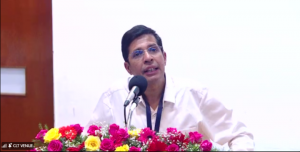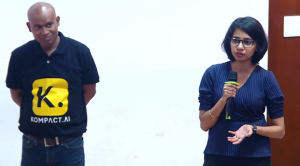India’s #1 Institute IIT Madras partners with US-based Startup to develop AI Models to solve grassroots challenges
Ziroh Labs has optimised 17 AI models, including DeepSeek, Qwen & Llama, on CPUs, instead of GPUs, making AI more accessible, scalable, cost-effective
CHENNAI, INDIA, May 11, 2025 /EINPresswire.com/ -- Indian Institute of Technology Madras (IIT Madras) is partnering with Ziroh Labs, a California-based Innovation-driven Deep-Tech Startup, and IITM Pravartak Technology Foundation to establish an AI Centre of Excellence to solve India’s grassroots challenges. this Centre will develop practical, efficient AI solutions for real-world challengesIn a major step towards making AI Models solve grassroots problems, Ziroh Labs unveiled the first version of ‘Kompact AI at IIT Madras recently. Kompact AI is an AI platform that enables foundational models to be built and served using CPUs without requiring GPUs (Graphics Processing Units, which are expensive and hard to obtain).
Ziroh Labs has already optimised 17 AI models, including DeepSeek, Qwen and Llama, to run efficiently on CPUs. These models have been benchmarked with IIT Madras, evaluating both quantitative performance and qualitative accuracy. For the first time, high-performance AI is built and deployed efficiently on CPUs, making AI more accessible, scalable, and cost-effective.
Kompact AI enables models to be deployed over CPUs without sacrificing quality and at least 3x performance than the current state of the art, thereby providing GPU-like scale and speed.
Elaborating on the need for such developments, Prof. V. Kamakoti, Director, IIT Madras, said, “This effort by Ziroh lab and IITM Pravartak is a nature-inspired one wherein they provide a platform that uses customized and trained domain-specific models to provide accurate inferences on affordable conventional compute machines. This effort is certainly a major step in arresting the possible AI divide between one who can afford the modern hyper scalar systems and one who cannot.”
This AI platform aims to democratise AI by allowing developers across the globe to build, train and infer AI using CPUs commonly found in Cloud Data Centers and Edge Devices. Kompact AI enables AI development without violating any data privacy and data residency regulations across the globe.
Kompact AI can play a transformative role as it leverages multiple optimisations algorithmically and implementation-wise to execute models on the low end without any support required for external communication, such as the Internet. As a part of this upcoming CoE, IIT Madras will work on smaller AI models for specific use cases, leveraging Kompact AI to optimise execution, making high-performance AI more efficient, accessible, and relevant to real-world applications.
CRITICAL NEED
AI development is currently dominated by ‘Big AI’—massive, general-purpose models designed for scale. While powerful, these models often fail to address India’s grassroots challenges as they demand extensive computing power, energy and infrastructure, making them costly and inaccessible to communities at the bottom of the pyramid.
Specific use cases such as aiding farmers, supporting students or assisting frontline workers in rural areas are best served by smaller, task-specific AI models that can run efficiently on smartphones and low-power devices, ensuring accessibility where it matters most.
While porting Foundational Models to CPUs is not new, it is seen that most models running on CPUs are small, quantised or distilled versions of the original mode
ABOUT IIT MADRAS
Indian Institute of Technology Madras (IITM) was established in 1959 by the Government of India as an ‘Institute of National Importance.’ The Institute has been ranked No.1 in the ‘Overall’ Category for the sixth consecutive year in India Ranking 2024 released by National Institutional Ranking Framework, Ministry of Education, Govt. of India & No.1 in the ‘Engineering Institutions’ category in the same Rankings for nine consecutive years – from 2016 to 2024.
Bhavani Veeravalli
Footprint Global Communications
bhavani.giddu@footprintglobal.com
Visit us on social media:
LinkedIn
Instagram
Facebook
YouTube
X
Legal Disclaimer:
EIN Presswire provides this news content "as is" without warranty of any kind. We do not accept any responsibility or liability for the accuracy, content, images, videos, licenses, completeness, legality, or reliability of the information contained in this article. If you have any complaints or copyright issues related to this article, kindly contact the author above.
Zylpha and Bedrock announce partnership.
Chlorine Compressors Market to Reach USD 125.8 Million by 2035, Driven by Enhanced Safety & Digital Integration
Ettifos V2X-AIR Secures OmniAir Certification Paving the Way for Global V2X Market Expansion
Kalendarium
Więcej ważnych informacji
 Jedynka Newserii
Jedynka Newserii

 Jedynka Newserii
Jedynka Newserii

Edukacja

Coraz więcej Polaków widzi korzyści płynące z obecności w UE. Co ósmy wciąż jednak nie potrafi ich wskazać
Członkostwo w UE cieszy się wśród Europejczyków rekordowo wysokim poparciem – wynika z tegorocznego Eurobarometru. Korzyści dla swojego kraju dostrzega 74 proc. obywateli Unii – to odsetek najlepszy od początku badań w 1983 roku. A w Polsce jest on jeszcze wyższy. Doceniamy przede wszystkim wkład UE w bezpieczeństwo, nowe możliwości zawodowe i rozwój gospodarczy kraju. Po 21 latach naszej obecności w UE wciąż jednak potrzebna jest europejska edukacja.
Polityka
Zmiany w obowiązku magazynowania gazu mogą obniżyć ceny surowca. To pomoże się przygotować do sezonu zimowego

Elastyczność bez zagrożenia dla bezpieczeństwa energetycznego – tak nową propozycję przepisów dotyczących uzupełniania zapasów gazu przed sezonem zimowym określają jej inicjatorzy z Parlamentu Europejskiego. Europosłowie proponują nieznaczne zmniejszenie wymaganego poziomu zapełnienia magazynów i rozciągnięcie w czasie terminu, w którym trzeba spełnić ten obowiązek. Jak podkreśla Borys Budka, ma to zapobiec spekulacjom na rynku gazu i tym samym pomóc obniżyć ceny surowca.
Konsument
Możliwość zakupu online może zachęcić kolejne grupy Polaków do ubezpieczeń zdrowotnych. Dziś korzysta z nich już prawie 5,5 mln osób

Polska jest jednym z liderów Europy w obszarze cyfryzacji sektora usług medycznych. Świadczą o tym m.in. popularność elektronicznych narzędzi zapewniających dostęp do danych zdrowotnych, e-recept czy wirtualna diagnostyka. Polacy są też otwarci na innowacje w zakresie ubezpieczeń zdrowotnych, z których korzysta już blisko 5,5 mln osób. Za pomocą nowej cyfrowej platformy Medicover chce zachęcić klientów do samodzielnej konfiguracji i zakupu polis online.
Partner serwisu
Szkolenia

Akademia Newserii
Akademia Newserii to projekt, w ramach którego najlepsi polscy dziennikarze biznesowi, giełdowi oraz lifestylowi, a także szkoleniowcy z wieloletnim doświadczeniem dzielą się swoją wiedzą nt. pracy z mediami.









.gif)



